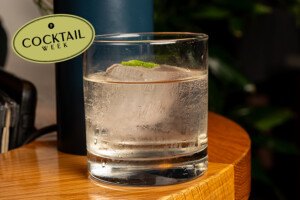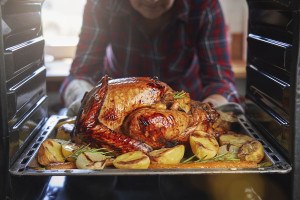The Wild Optimists Who Turned the Philly Wine Scene From Blah to Brilliant
The, ahem, challenges of selling alcohol in Pennsylvania are well documented. Lucky for us, there’s a band of brave souls fighting back.
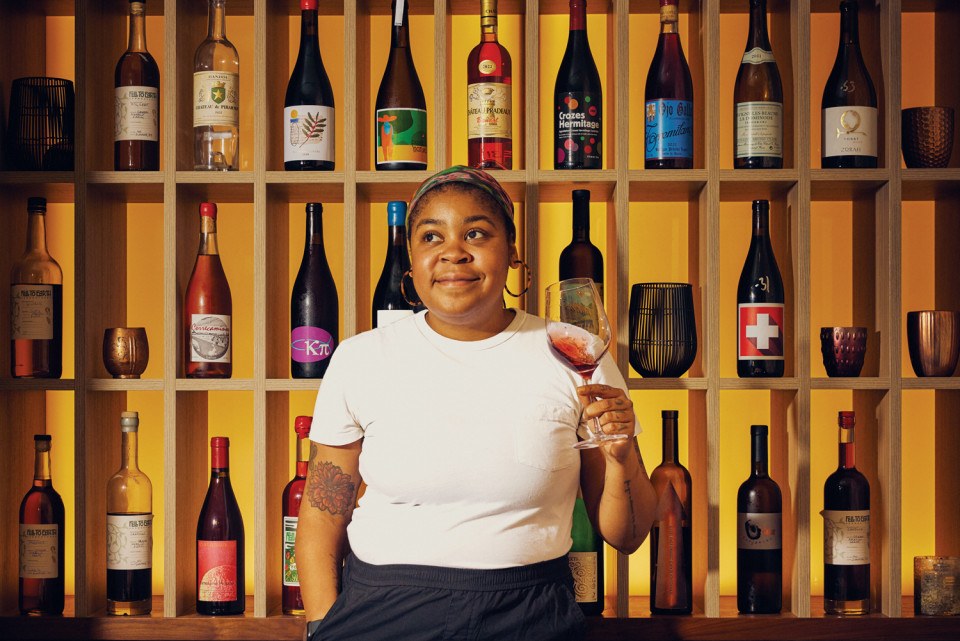
D. Stubblefield of Bloomsday at the restaurant’s Fancy Wine Shop is helping make Philly’s wine scene more exciting than ever. / Photography by Ed Newton
A New Yorker walks into a bar — Bloomsday Cafe’s bar, to be specific — studies the bottle list, and flags down GM and beverage director D. Stubblefield to ask why the very cherry Molettieri Ischian aglianico said New Yorker always orders at a favorite Brooklyn haunt for $30 costs $55 here.
Yes, this happens. And Stubblefield is happy to respectfully take a guest to school. “Imagine if I got the same wine that you can get for the same price, but I have to mark it up because I have to sell it,” she tells the diner. “And I only get three bottles of it a year.”
TMI? By conventional hospitality standards, perhaps, but Stubblefield is part of a new generation of wine professionals doing things their own way. “Growing up in a Black family, you talk about everything. Transparency is almost like a given,” she tells me, so she’s open with guests about the challenges Philly wine sellers face as a result of the state’s much-discussed laws on selling alcohol. And she encourages her servers and bartenders to put it all out there, too. Stubblefield’s reasoning: “If you understood how hard it is for me to get these wines, look at what a gift I’m giving you.”
Those gifts reside on Bloomsday’s list and in the restaurant’s retail Fancy Wine Shop, where I find Stubblefield unboxing a fresh delivery of cases like a kid opening Christmas toys. They include Slovenian malvasija, Basque txakolina, and magnums of late-harvest riesling. When I ask for her current crush on the by-the-glass list, she points out the Domaine Philémon Croix d’Azal braucol, an organic red gusher from a single-hectare plot in southwestern France. I’d never heard of the braucol grape, and this particular wild-yeasted expression drank with contradictions of uplifting acidity and down-to-earthiness. Thanks to this one-minute interaction with Stubblefield, I’ll now order braucol wherever I see it, chasing a memory of stewed rhubarb and rainy woods. These moments are what’s so cool about wine — and “You cannot survive if you don’t have a cool wine list,” Stubblefield says.
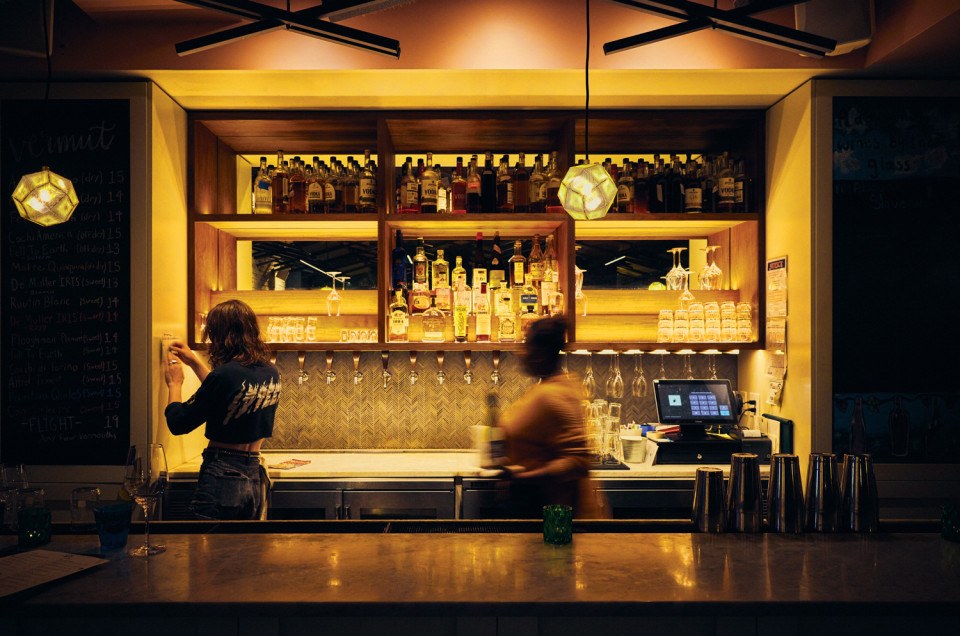
Behind the bar at Bloomsday
Despite the challenges, for the first time in Philadelphia history, great wine lists are everywhere. Seeds sown by a few brave bars like Jet (founded 2010), A.Kitchen (2011), Fountain Porter (2012) and the Good King Tavern (2013) have borne new generations of defiant fruit, expressed in lists from the Lunar Inn to My Loup. A decade ago, at a music venue like Solar Myth on South Broad, you’d have been toasting artists like Marshall Allen or Charlie Hall with anonymous red or white plonk, not luscious skin-contact Australian trebbiano. On Spring Garden, Cortese pét-nat and Jura crémant chase the Brigantine bivalves at Poison Heart, an idiosyncratic punk-rock oyster bar that in the past most certainly would have been BYOB. Good King and Le Caveau’s Chloé Grigri and Vincent Stipo tripled down on wine service with Superfolie — the root folie is French for madness — in March, turning a frumpy cafe into a chic little den that feels beamed in from the 11th Arrondissement. Paris is great, but have you ever had briny sea beans on buttered toast while drinking melon-y, lemony Seneca Lake riesling on Spruce Street?
Fueled by young drinkers, consumer demand is ravenous despite the fact that it’s more difficult to procure obscure wines here because what’s readily available for purchase in the state is determined by the Pennsylvania Liquor Control Board, the entity tasked with enforcing the state’s long-controversial alcohol laws, and one not known in aficionado circles for a particularly sophisticated palate. “They’ve spent decades filling their state-owned stores with nonsense bad wine and overcharging for it,” says Frank Kinyon, wine director for A.Kitchen and A.Bar. “We’re essentially trying to make wine a thing in a system that doesn’t want it to be a thing.” This has fostered something of a freewheeling, rebellious IDGAF mentality that resonates as very Philly. At Kinyon’s weekend Deep Cuts series, he and his team pour special selections by the glass, like the Jean-François Ganevat savagnin that rarely deigns to grace America with its presence. When you’re only allocated three of these rarities a year, opening a bottle to pour by the glass makes all the sense of whacking up a Wagyu porterhouse to make kebabs. Kinyon, who sold out the bottle in one day, shrugs: “I think we’re just kind of crazy.”
In Philadelphia, with great wine lists come great challenges presented by the PLCB — challenges that neighboring states don’t have to deal with.
In New Jersey, Vanessa Wong’s fingers hopscotch across the bottle tops. Cork tops, screw tops, naked tops, tops hugged in inscribed foils the colors of charcoal or bubblegum — each crowns a bottle of rosé at Wahine Wine Company, the bottle shop she runs with husband Ryan Slaven down the Shore in Ventnor Heights. It’s August, and the liquids in the bottles shimmer in the slanting sunlight, a Barbie ombré deepening from barely blushing to coral to the juicy magenta of fig guts.
Wong plucks a bottle of La Belle Étoile, a peachy Rhône rosé made primarily from organic cinsault grapes, from her garden of bottles. It’s one of the few wines she sells here and at Fishtown Social, the convivial bar she and Slaven also run. The couple opened that spot in 2016 — the year you may have noticed a blossoming of bottle shops around the city, following Governor Tom Wolf’s signing of Act 39 into law. Among other measures, the bipartisan act expanded retail wine sales outside the state-store system, a transformative leap of progress for the byzantine establishment that is the PLCB. The general sentiment in the Philly wine industry at the time and in the years that followed was that things seemed to be getting … better, even if just a little. Lately, though, industry folks are starting to feel that progress is backsliding.
In my interviews with more than a dozen professionals in the space, from bar owners to importers to sommeliers, I asked each source to fill in the blank on the following question: One word to describe working in wine in the context of the PLCB is ______. A selection of answers: tedious, humbling, frustrating, Soviet, workable, anti-business, confusing, adventurous, daunting, war, and “thrilling.” That last is courtesy of Jane Fryer, who curates the tight and spiffy list for Laurel, where she’s also a partner and the GM. Though she’s more diplomatic than most, the sarcasm in her voice is as detectable as the stone fruit and limestone in the Lehigh Valley grüner veltliner currently on Laurel’s list. “You never know what they’re gonna do next,” she acknowledges.
What has the 90-year-old state-run agency done recently? The bugaboo du jour is the Licensee Online Order Protocol (LOOP), the new ordering system. It was launched in July with good intentions: to give sellers a way to place orders through a 24/7 online portal. Previously, orders had to be placed with stores during business hours. “There was so much notice saying: If you do all these steps correctly, everything will work out,” Fryer says. “Then we do all the steps correctly, and there’s glitch after glitch.”
Jason Malumed, an importer and distributor whose clients at MFW Wine Co. include Di Bruno Bros. and Pizzeria Beddia, used to say it only took one and a half times more work to operate in Pennsylvania. “Now,” he says, “it’s about three times more work.”
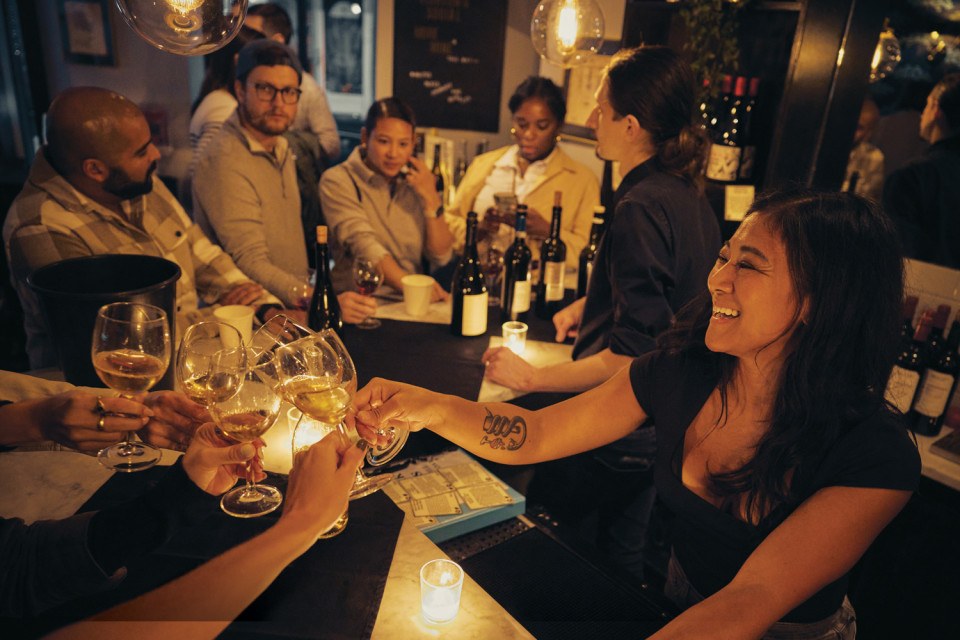
Vanessa Wong toasting at Fishtown Social
Wong presents La Belle Étoile as an example. To get this wine from the outskirts of Avignon to Philly, she submits an order to her distributor, who enters it via LOOP. Wong then logs into LOOP to review, approve and pay for the order, after which the distributor logs in, confirms that the order is paid, and obtains a shipping label. Wong then waits for her designated state store to receive her order, upload it, and mark it ready for pickup. Back in the day, she or a service she paid for had to physically collect the order and bring it to Fishtown Social. Now, with direct delivery — another provision of Act 39 — “This state-store pickup hustle has been eliminated for most of the wine that I order,” she says, but notes, “What I’ve described assumes everything is processed smoothly, which is most often not what happens.”
To get La Belle to Wahine, in contrast, Slaven says, “I send a text or email to our wine rep — ”
“And it just shows up,” Wong finishes.
“We have worked to address LOOP functionality and response time, and performance has improved significantly since we went live in July,” says PLCB spokesperson Shawn Kelly. “We appreciate suppliers’ and licensees’ cooperation and patience as we transitioned to the new systems.”
Buying and selling wine in Philly largely exists at the unlucky intersection of low convenience and high cost. After case discounts, Wong pays $7.33 wholesale in New Jersey for the rosé and charges $15 retail. In Pennsylvania, the standard state markup (10 percent), liquor tax (18 percent) and other surcharges bring Wong’s cost to $13.59 for the same bottle. She charges $20 at Fishtown Social. In this lose-lose system, where consumers pay more and business owners make less, many producers “won’t put their whole portfolio in Pennsylvania.” Slaven says, adding that some producers will only put a few wines in Pennsylvania just to have a presence in the state, but won’t fully invest here because they know they’ll sell more of their production with zero hassle in New Jersey and New York.
To illustrate the depressive effect, Wong sweeps her arm to encompass Wahine’s selection of biodynamic orange gewürztraminer, unfiltered Barossa Valley shiraz, and roughly 138 other labels: “Ninety percent of what’s on this shelf, you can’t get in PA.” She hears from frustrated producers who wonder, “Why do we bother?”
In response, the PLCB’s Kelly says, “We do the best we can to support suppliers and licensees doing special-order business, but we must work within the statutory and regulatory framework for these sales.”
Wong, Slaven, Fryer, Malumed and their compatriots remain committed to working in wine in perhaps the most inhospitable environment in the entire country. The optimism is as impressive as it is illogical. “You’re trying to run a business where your cost of goods is 55 percent higher than in neighboring markets,” Malumed says. “It’s like, who in their right mind?”
Lucky for us, wine people clearly aren’t.
Growing grapes for wine is like raising kids. “Spoil them too much, they’ll grow up to be less interesting and ambitious,” says the Ardmore-based writer Brian Freedman, whose smart new book, Crushed, tells stories of catastrophe and innovation in the wine industry in the context of a warming planet. “Paradoxically, some of the best vineyard sites have surprisingly poor soil.”
Does “soil” — and we’re speaking deeply metaphorically here — get poorer than in Philadelphia? “It’s like we have to pretend all the horrible bullshit doesn’t exist for us to keep any semblance of sanity, because if we actually look at it in the eyes, if we actually see it for what it is, we wouldn’t be incentivized to take part,” says Alex Tewfik (a former food editor of this magazine), who can be found pouring mystery bottles of chilled Piedmontese reds and effervescent Catalonian whites under vibey labels like “Lip-smacking” and “Zings and Zaps” at his East Passyunk restaurant, Mish Mish. “Delusion is our gasoline.”
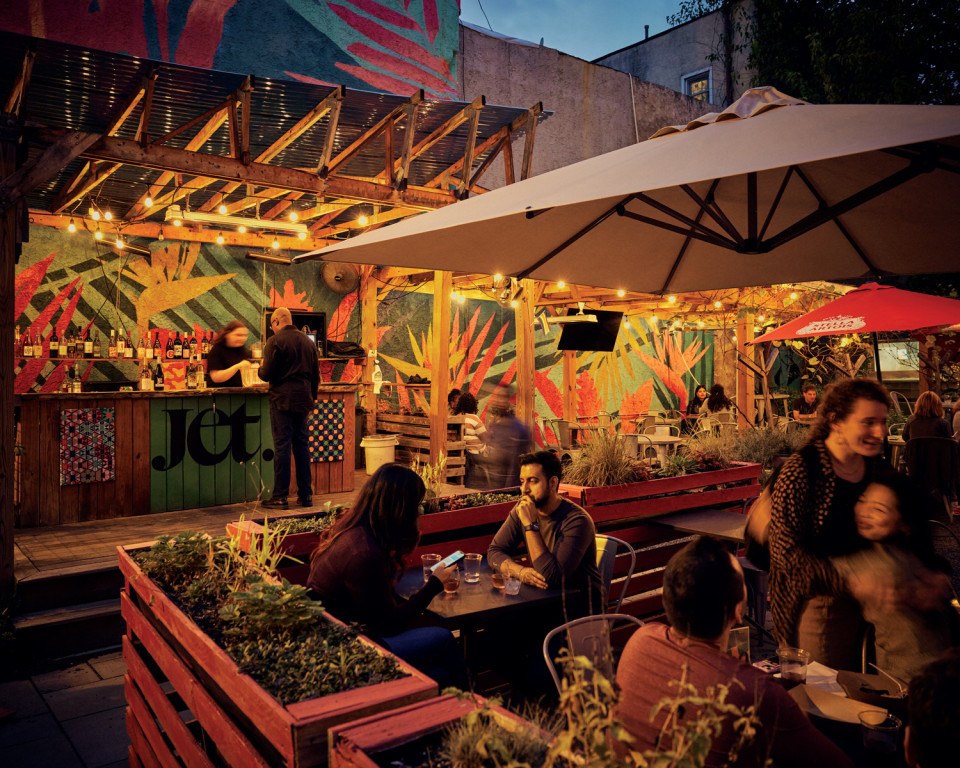
Jet Wine Bar’s Garden
And our fertilizer. During a break from deep-cleaning Fishtown’s Mural City Cellars — the city’s first urban winery — ahead of the incoming harvest of Swedesboro cab franc and West Chester pinot gris, winemaker Nicholas Ducos tells me, “Creativity can come from restrictions.” And one way to take a machete to the red tape is to get creative, like Ducos and his partner, Francesca Galarus. Winemakers have the freedom to opt out of the state system entirely. Mural City considered selling to the PLCB at first, but, Ducos explains, “They set the retail price, and you can’t undercut them.” So instead, Mural City sells direct to consumers at their location and self-distributes to bars like Wilder, Martha and Jet. At Bloomsday — another Mural City stockist — Stubblefield’s mentors, Tim Kweeder and Zach Morris, will be taking advantage of the same favorable conditions by expanding their pandemic pet project, Dumpster Juice Vermut, into the full-fledged Fell to Earth, with new headquarters in East Falls.
The PLCB permits producers five satellite licenses to sell their wares — “Basically, five liquor licenses for $500 a pop,” as one winemaker explains these golden tickets, which also allow the locations to sell other wine, beer and spirits produced in-state. Forîn, for example, is better known for its Kensington cafe, but it’s also got a behind-the-scenes winery that allows the former to sell its own Blueberry Honey Wine and Table White, plus cans of Human Robot and ube Jell-O shots made with Boardroom spirits. Forîn is big into collabs, too, with bottle projects with Hale & True Cider, Mural City (maker of Forîn’s lovely vermouth), and Wayvine, whose low-intervention Chester County vignerons, James and Zach Wilson, used one of their five licenses to partner with chefs Alex Benniato and Jason Cichonski last year on Tulip Pasta & Wine Bar. Without Wayvine as a partner, a regular liquor license would have cost the restaurant upwards of $200,000.
Collaboration isn’t just a warm-fuzzy feature of the local wine industry; it’s a necessity. In the absence of an efficient and rational system, a new one must be built. Roots burrow deeper in poor soil. “Every single good thing that happens in wine in Philly,” says Tewfik, “is a flower growing in a sidewalk crack.” Enough flowers, enough growth, as every curmudgeonly neighbor will tell you when the city plants a tree in the pavement, can buckle concrete. Fetch the shovels.
Published as “The Counterintuitive, Unhinged Optimism of Philly Wine Bars” in the November 2023 issue of Philadelphia magazine.
